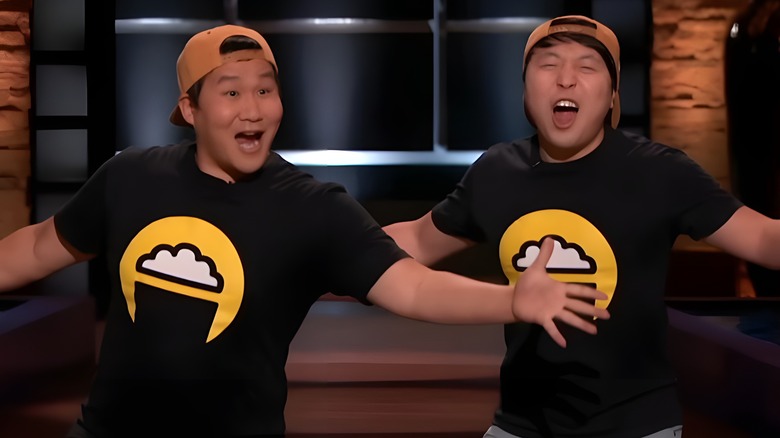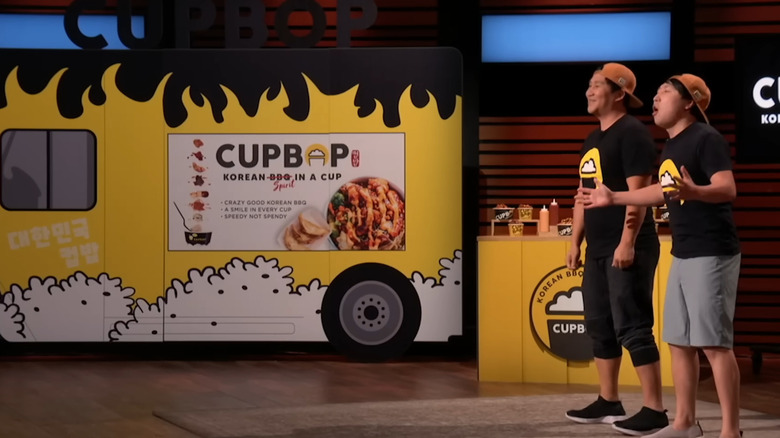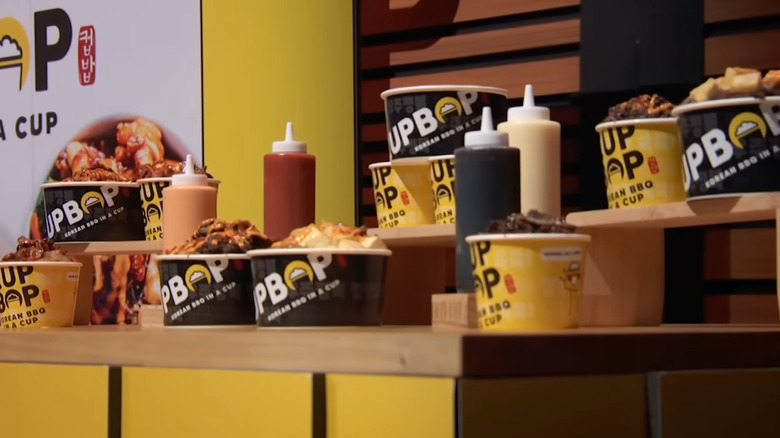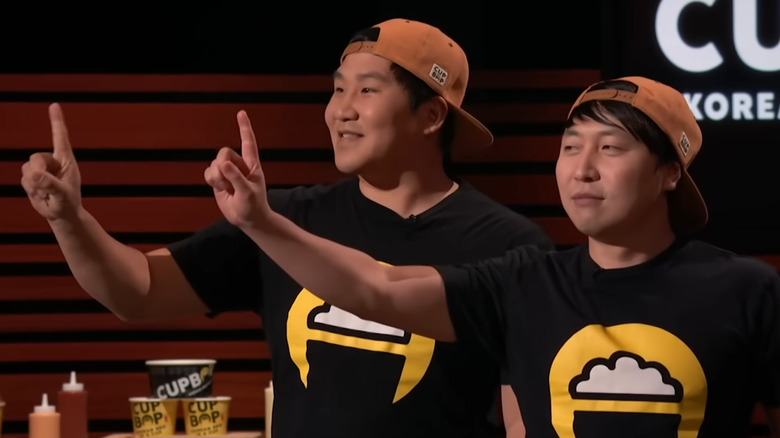Whatever Happened To Cupbop After Shark Tank?
Jung Song and Dok Kwon plan to bring the heat with their Korean barbecue chain, Cupbop. They sell hefty cups of various meats and dumplings served alongside noodles and dumplings — all topped with a range of spicy sauces. The company is built off of a culture of boisterous energy and constant fun, which Song explains in their "Shark Tank" episode is in line with the party-hard nature of Korean society.
Song began the business in Salt Lake City in 2013. In the beginning, it was only a food truck. To attract customers, Song would dance energetically in front of his truck. Kwon was his first customer, falling in love with the business and their products. They started a friendship and stayed in touch as Kwon traveled to New York to become an investment banker. He remained in this career for seven years but became tired of that path. He eventually called up Song about potentially being a partner. By this point, Song had already begun launching storefronts, with plans to overtake Panda Express as one of America's fastest-growing Asian restaurant chains.
Cupbop had proven to be a standout business within an untapped market in the U.S. With such ambitious plans for the future, the team would need a shark to take a bite out of their company if they wanted their goals realized.
What happened to Cupbop on Shark Tank?
On Season 13 of "Shark Tank," entrepreneurs Jung Song and Dok Kwon came looking for an investment of $1 million for a 3% equity stake in their business. The $33.3 million valuation would normally be a pretty astronomical ask for most entrepreneurs, but given Cupbop's rapid growth rate, they'd likely be able to justify their value.
The dynamic duo introduces themselves and their business with some zestful dance moves. The sharks try some samples and fall in love. Even if the bowls are spicy, they agree they're fantastic; Kevin O'Leary even declares their product one of the best food concepts he's tried on the show. But the main course is their numbers. Not only do they have gross margins of 75%, but their current sales for the year are $18.7 million. Over the last five years, they reached up to $10.5 million. They even experienced growth during the COVID-19 pandemic thanks to their successful takeout and delivery services. To top it off, they have not had to raise money any other way outside of organic cash flow.
Ultimately, their vision is to provide a rich and interactive space for their customers by having stores nationwide. Every shark makes an offer, although most only want to give the $1 million as a loan. Mark Cuban has the simplest ask, willing to give the $1 million for 7% equity. The duo manages to talk him down to 5%, and a deal is made. So was Cuban the right ingredient to help them hit it big?
Cupbop after Shark Tank
It didn't take much for the Cupbop crew to strike a deal with a shark. With Mark Cuban on board, the sky seemed to be the limit for the plucky entrepreneurial team of Jung Song and Dok Kwon in their quest to put their chain on a national level.
In December 2022, the team announced plans for further franchising efforts. "Cupbop's national growth so far has been incredible," Kwon stated in a press release statement. "And I'm excited to use my passion and knowledge to help our franchisees find success within the Cupbop brand. We look forward to building on the momentum we have seen so far and continue to bring delicious Korean Barbeque to more cities." By the end of the year, they had 42 U.S. locations and planned to open five more. However, they faced some minor setbacks during this point, as prices for proteins such as beef began to surge. Nevertheless, Kwon remained dedicated to ensuring the company's survival and the food's quality.
Early 2023 saw the team introduce a new player. They brought on the restaurant tech platform Qu to act as their technology partner. The collaboration has provided Cupbop with a smoother system to manage its employees and daily operations. "Qu is a true partner that is willing to grow and scale with us as we adopt new technology to enhance our stores," Kwon said in an interview with Food On Demand.
Is Cupbop still in business?
As can be imagined, Cupbop has only grown since then. The Korean barbecue restaurant chain has yet to reach the nationwide presence they ultimately aim for, but they are certainly on the right track.
In the United States, Cupbop has 47 stores in Utah, Idaho, Colorado, Arizona, Nevada, and Oklahoma. In June, they had their grand opening in Roy, Utah, where they sold 1,500 bowls, a new record for the company. Cupbop will soon be opening up its first two locations in Texas. This marks a significant achievement for the business, as Dok Kwon has long been looking to expand to the Southern region.
On "Shark Tank," Robert Herjavec didn't believe the company was worth $33.3 million valuation. His offer for $5 million at 28% inputted an $18 million valuation at best — but boy, was he wrong. Even Cupbop's eventual sales blew through those estimates. Currently, the company is seeing a systemwide annual revenue of $40 million. Their total sales have equated to $150 million, alongside an estimated net worth of $180 million. The Cupbop team has exceeded their expectations, but even then, they only see more for Cupbop's future.
What's next for Cupbop?
Cupbop has achieved the success that some "Shark Tank" companies could only dream of. With millions in revenue, a unique customer experience, and little in the way of substantial competition, many would be satisfied with where they are. But Dok Kwon believes their business is in the midst of a growing trend they aim to take full advantage of.
In an interview with QSR Magazine, Kwon notes the increased popularity of Asian cultural offerings in the United States, especially from Korea. "There is an outsized secular growth happening for Asian concepts," he commented. "Stacked on top of that, everything Korean is cool right now. From K-pop, to K-dramas, to 'Squid Game' on Netflix, people are very interested in Korean culture, and with that, demand for Korean cuisine is growing. I think as we branch out into more states, we're going to feel that even more."
Jung Song is like-minded, feeling there is rich value in bringing Korean culture to as grand a scale as possible. "My dream with Cupbop has always been to take it to the moon," Song said in an interview with Deseret News. "We want everyone in the universe to try Cupbop and experience our culture through our food."
On Facebook, they recently shared that Song is in Korea with his family. However, the caption hints at some exciting prospects for the near future, stating, "Some BIG things are coming for Cupbop!!!" Even after such immense growth, it seems like Cupbop is just getting started.




